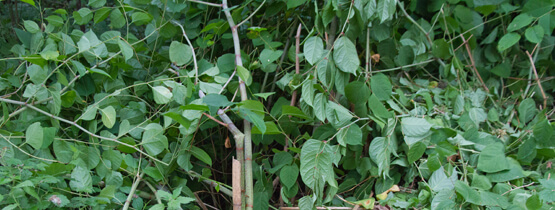
The UK has been through a lot recently when it comes to weather with storms Dudley and Eunice, and wouldn’t the cherry on top of the blustery cake be that, as well as flooding, the storms have brought Japanese Knotweed to your house?
Hopefully that isn’t the case, but poor weather like we’ve been having in the UK recently can actually encourage the spread of Japanese knotweed. Interested in finding out how? Keep reading!
(Incidentally, if you’re interested in finding out a bit more about exactly why Japanese Knotweed is so bad, check out the link below.)
Why is Knotweed Bad?
How Do Storms Help Japanese Knotweed to Spread?
Storm Eunice actually set the UK record for the fastest recorded wind at 122mph, but the biggest concern when it comes to the spread of knotweed is actually flooding. A little confused? Let us explain.
While it might seem reasonable to assume that wind would carry pores or seeds to encourage the spread of knotweed, it's actually spread via its extensive underground root system; fragments of the plant's roots known as rhizomes weighing as little as 0.7g can be enough for a new plant to grow. These little fragments can separate from the roots that grow alongside canals, rivers, and water sources and be carried downstream by strong currents.
This mode of spreading is only made more evident by the extensive presence of Japanese knotweed along the sides of lakes, streams, canals, and waterways throughout the UK. Flooding especially spreads these menacing plants, and in turn, flooding is caused by them; not only does flooding increase the spread of knotweed, but the presence of knotweed actually increases the risk of flooding in poor weather!
Japanese knotweed roots and rhizomes are unstable and easily fragmented in comparison to the roots of British native trees and shrubs. Because of this, riverbanks infested with Japanese knotweed are easily eroded and collapse under pressure from poor weather. This in turn carries more rhizomes further downstream, which spreads knotweed to other banks where it will destabilise their structure, collapse the banks, and spread root fragments even further again in a vicious cycle.
Japanese Knotweed isn’t a problem to be taken lightly, and it's as difficult to remove as it is easy to spread. With red weather warnings being issued all over the UK with devastating winds, rain, and flooding, these recent conditions were perfect for the spread of knotweed.
If your property has a knotweed infestation, or you’re worried that one of the recent storms has brought knotweed to your door, request a FREE survey today! Our first-class team will survey your property and help you conclude what service is best for you.
Request a FREE Survey
Read More: Can Japanese Knotweed Grow Anywhere?
